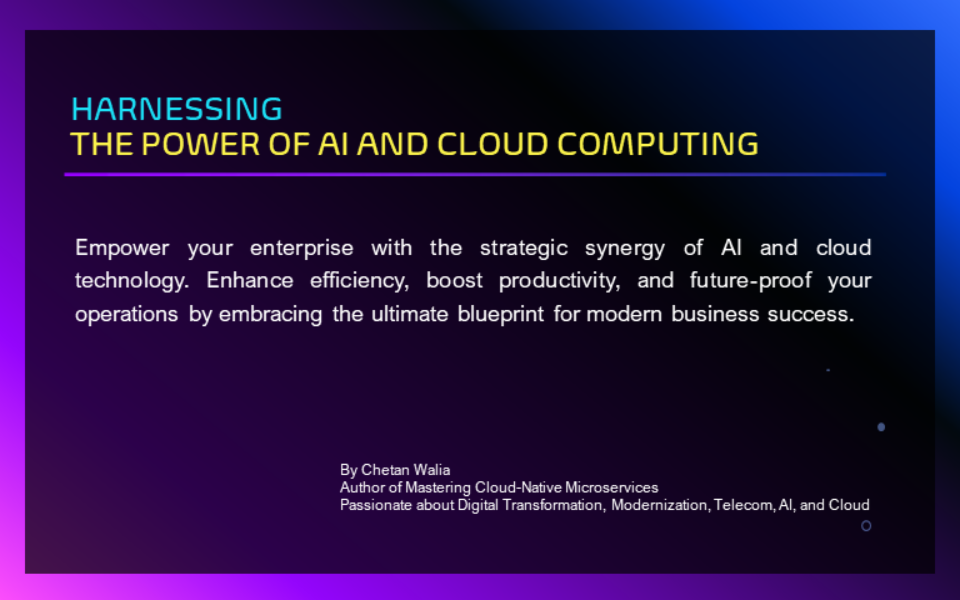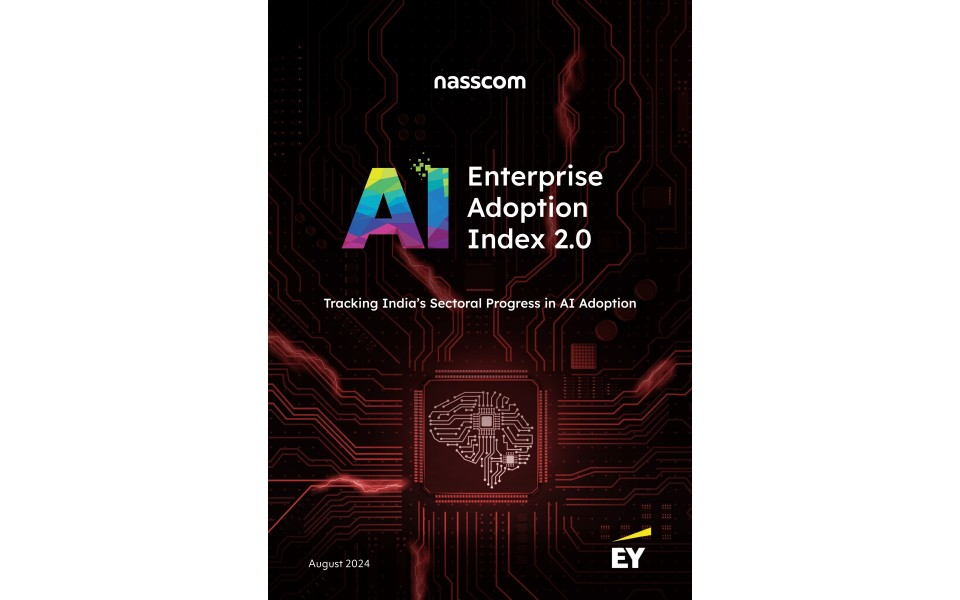This blog explores the strategic integration of AI and cloud computing, highlighting their synergistic impact on business innovation, operational efficiency, and competitive advantage. It provides insights into how executives can leverage these technologies to drive transformation across industries, with a focus on telecom as a key example.
In today's rapidly evolving digital landscape, the convergence of Artificial Intelligence (AI) and Cloud Computing is not merely a technological advancement. The integration of these two technologies offers unprecedented opportunities for businesses to innovate, scale, and thrive.
Perfect combo for driving Business Transformation
For executives, the fusion of AI and cloud computing represents a powerful lever to drive business transformation. This relationship is inherently symbiotic, where AI enhances cloud capabilities, and the cloud, in turn, amplifies AI's potential. AI’s ability to automate complex processes such as data analysis, security management, and decision-making can free up valuable resources, allowing IT teams to focus on innovation and strategic initiatives rather than routine tasks.
Technical Insight:
- Data Processing: AI models, particularly those using machine learning (ML) and deep learning (DL), require immense computational power to process large datasets. Cloud computing provides the necessary infrastructure, offering powerful CPUs, GPUs, and TPUs that can scale on demand, ensuring that AI algorithms are trained efficiently and deployed rapidly.
- Edge Computing: In industries like telecom, edge computing—processing data closer to the source—becomes crucial. AI algorithms deployed on edge devices can make real-time decisions, reducing latency and improving customer experience. The cloud supports these edge devices by managing the deployment, updates, and scaling of AI models across distributed networks.
Use AI for Your Business:
- Accelerate Decision-Making: Implement AI-driven analytics in the cloud to quickly process large volumes of data, enabling faster, data-driven decisions that can significantly impact your bottom line.
- Optimize Network Operations: In telecom, AI can analyze network data stored in the cloud to predict outages, optimize bandwidth allocation, and enhance customer service.
Why Cloud Computing is Essential:
- Scalability and Flexibility: The cloud offers the ability to scale AI deployments as your business grows, without the need for significant upfront investments in infrastructure.
- Global Accessibility: Cloud computing ensures that your AI tools are accessible across geographies, enabling a unified approach to decision-making and operations.
Applications Driving Innovation using the Power of AI and Cloud Computing
The intersection of AI and cloud computing opens up new avenues for business innovation, enabling the development of applications that were previously unimaginable. For example, AI-powered IoT devices, hosted in the cloud, can transform industries by providing real-time insights and enabling predictive maintenance, thus reducing downtime and increasing operational efficiency.
Telecom Example:
- Network Optimization: Telecom companies can use AI in the cloud to optimize network performance. AI algorithms can predict traffic patterns, manage network resources more efficiently, and reduce latency. For instance, AI can dynamically reroute data during peak times to prevent congestion, ensuring a smooth customer experience.
- Customer Service Automation: AI-powered chatbots, hosted in the cloud, can handle routine customer inquiries, troubleshoot common issues, and even predict customer needs based on historical data, all while reducing the load on human agents.
Use AI for Your Business:
- Develop Smart Services: Leverage AI in the cloud to create intelligent services that adapt to user behavior, providing a personalized customer experience that can drive loyalty and revenue. In telecom, this could mean offering personalized data plans based on usage patterns.
- Enhance Customer Engagement: Deploy AI-powered chatbots in the cloud to offer 24/7 customer support, improving customer satisfaction and reducing operational costs.
Why Cloud Computing is Essential:
- Rapid Deployment: Cloud platforms allow for the quick deployment of AI applications, enabling your business to respond rapidly to market demands and technological advancements.
- Cost Efficiency: The cloud reduces the need for extensive on-premises infrastructure, allowing you to experiment with AI without incurring significant capital expenditures.
Building a Competitive Edge
Deploying AI within cloud environments offers strategic advantages that can position your business ahead of the competition. The cost savings, productivity gains, and enhanced automation capabilities provided by AI and cloud computing can directly impact your bottom line.
Telecom Example:
- Predictive Maintenance: Telecom companies can use AI in the cloud to predict equipment failures before they occur. By analyzing data from network hardware, AI models can identify patterns that indicate potential issues, allowing for preemptive maintenance and reducing downtime.
- Revenue Assurance: AI can analyze billing data in the cloud to detect anomalies and prevent revenue leakage. This ensures that telecom companies capture all possible revenue, improving profitability.
Use AI for Your Business:
- Reduce Operational Costs: Use AI to automate routine tasks and processes, reducing the need for manual intervention and lowering operational costs.
- Enhance Productivity: Leverage cloud-based AI tools to streamline workflows, enabling your teams to focus on high-value activities that drive business growth.
Why Cloud Computing is Essential:
- Seamless Integration: Cloud platforms provide a seamless environment for integrating AI into your existing systems, ensuring that new technologies can be adopted without disrupting operations.
- Continuous Innovation: Cloud computing enables ongoing updates and improvements to AI tools, ensuring that your business remains at the forefront of technological advancements.
The Road Ahead: Harnessing the Power of AI and Cloud Computing
As cloud computing continues to mature, its integration with AI is poised to revolutionize industries and redefine competitive landscapes. Business leaders must act decisively to harness this convergence, leveraging AI and cloud computing to drive innovation, enhance operational efficiency, and deliver superior customer experiences.
Telecom Example:
- 5G and AI Integration: As telecom companies roll out 5G networks, AI will play a critical role in managing and optimizing these networks. Cloud computing will provide the scalable infrastructure needed to process the vast amounts of data generated by 5G, enabling real-time analytics and decision-making.
- AI-Driven Content Delivery: AI can optimize content delivery over telecom networks, ensuring that users receive high-quality streaming services, even in congested networks. Cloud platforms will support the AI models that drive these optimizations, ensuring they can scale to meet demand.
Use AI for Your Business:
- Drive Strategic Innovation: Invest in AI research and development within cloud environments to pioneer new business models and services that can differentiate your brand in the marketplace.
- Stay Ahead of the Curve: Foster a culture of continuous learning and innovation, ensuring that your teams are equipped with the skills and knowledge to leverage AI and cloud computing effectively.
Why Cloud Computing is Essential:
- Future-Proof Your Business: Cloud computing provides the foundation for future technological advancements, enabling your business to adapt and thrive in an increasingly AI-driven world.
- Global Collaboration: The cloud facilitates collaboration across borders, allowing your business to tap into global talent and innovation networks.
In conclusion, the unification of AI and cloud computing is not just a technological shift—it is a strategic move that can unlock new opportunities for growth, innovation, and competitive advantage. By embracing this convergence, business leaders can position their organizations for success in the digital age.



































